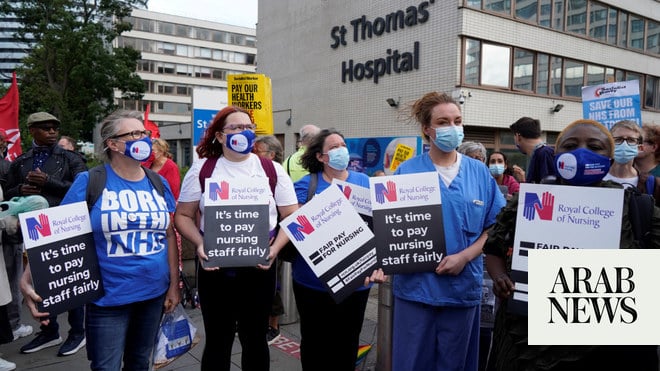
Dozens of patients with Covid-19 have been turned away from the NHS Nightingale hospital in London because it has too few nurses to treat them, the Guardian can reveal.
The disclosure comes amid a growing belief among hospital management in the capital that the Nightingale, built to great acclaim over just nine days, was becoming a “white elephant”.
The hospital has been unable to admit about 50 people with the disease and needing “life or death” care since its first patient arrived at the site, in the ExCeL exhibition centre, in London’s Docklands, on 7 April. Thirty of these people were rejected because of a lack of staff.
The planned transfer of more than 30 patients from established London hospitals to the Nightingale was “cancelled due to staffing issues”, according to NHS documents seen by the Guardian. All the patients had been intubated and were on a ventilator because they were so unwell.
The revelation raises questions about the role and future of the hospital, which up until Monday had only treated 41 patients, despite being designed to include almost 4,000 beds.
That means that the hospital has rejected more patients, owing to a combination of understaffing and the patients’ health, than it has treated. Of those 41 patients, four have died, seven have been discharged to a less critical level of care, and the other 30 were still being cared for at the Nightingale.
The hospital is being obliged to reject people needing care because it cannot get enough of the nurses usually based in other hospitals to work there, staff at the new facility claimed.
One member of staff said: “There are plenty of people working here, including plenty of doctors. But there aren’t enough critical care nurses. They’re already working in other hospitals and being run ragged there. There aren’t spare people [specialist nurses] around to do this. That’s the problem. That leads to patients having to be rejected, because there aren’t enough critical care nurses.”
Almost 20 other patients have been rejected by the Nightingale on medical grounds, for example because they were “too unwell to transfer” or had had a tube inserted into their throat to help them breathe, or because they did not meet the new hospital’s strict clinical admission criteria.
The Nightingale, which was opened in a high-profile ceremony involving Prince Charles on 3 April, admitted its first patient on 7 April and rejected the planned transfer of a patients from another London hospital for the first time on 9 April.
NHS England decided to create the hospital because they feared that within weeks hospitals in the capital would have been overwhelmed by the numbers of people needing intensive care.
At the time the health secretary, Matt Hancock, said that the NHS was “preparing for the worst but hoping for the best”.
One senior intensive care doctor said: “The Nightingale is clearly not a hospital. It’s an emergency overflow facility to ventilate patients to stop them from dying when hospitals have run out of space.”
Sir David Sloman, head of the NHS in London, oversaw the project, in which the army was closely involved, and it was approved by Sir Simon Stevens, chief executive of NHS England, and the prime minister, Boris Johnson.
Sloman wrote to NHS heads in London last Friday asking them to provide about 200 doctors and nurses so that the Nightingale could be used for a growing number of patients needing critical care and help established hospitals resume operations and preparations for the winter ahead.
Despite this, the Nightingale’s inability to admit patients has left established London hospitals unable to relieve the pressure on their overcrowded intensive care units by transferring people suffering from the coronavirus.
That has had the biggest impact on Northwick Park hospital, north-west London, which had to declare a “critical incident” and temporarily shut its doors to new admissions last month as the impact of the coronavirus worsened. It has been unable to transfer more than 30 patients to the Nightingale since 9 April, with many of those planned switches “cancelled due to staffing issues”, the documents show.
The Royal Free hospital, in Camden, London, has also had to abandon plans to transfer about 15 patients from its ICU to the Nightingale. Again, that was often due to lack of staff. Other hospitals in the capital, including St Mary’s, the Royal London and North Middlesex, have also had transfers blocked.
The Nightingale is already under intense scrutiny amid disagreements among NHS leaders and senior doctors in the capital over its purpose and whether or not it is a good use of resources.
A senior official at a London trust said: “It’s a white elephant. When it was conceived a month ago we were facing the prospect of hospitals in London being overrun and mass burial sites like in New York. We thought that London would be Italy and there would be more patients needing level 3 intensive care treatment by this stage.
“But the expected doubling every three days in the number of patients needing to be admitted to ICU didn’t happen. London hospitals doubled, tripled and in some cases quadrupled the capacity of their ICUs, so still have spare capacity, which means the Nightingale hasn’t been needed.”
Other NHS planners said it was better to over-prepare for the pandemic. A senior intensive care doctor said: “ It was a sensible project designed to stave off the type of situation we saw in Italy. It may have just been a matter of days and we would have been thankful it existed. Thankfully, good surge planning to massively increase critical care capacity in hospitals, and a last ditch redistribution effort to move patients from stressed small hospitals to larger hospitals with space, has meant that we have not needed this type of facility.”
Stevens echoed that view at the weekend, saying: “We have not yet had to make extensive use of the Nightingale London thanks to the hard work of NHS staff, who have freed up more than 30,000 existing hospital beds, and the public, who have played their part by staying at home and saving lives.”
An NHS London spokesperson said: “The most important point about staff at the Nightingale is that thanks to their care and expertise, patients in that hospital are being successfully treated, discharged and ultimately having their life saved.
“There remains spare capacity in the critical care network across the capital to look after all coronavirus patients and others who need our care, and while it is incredibly reassuring for both staff and patients to have backup capacity at the Nightingale to alleviate pressure on ICU departments where needed, patients can be transferred to other hospitals in the city if they are better placed to receive them at that time – as is always the case.”
A Department of Health and Social Care spokesperson said: “It is misleading to suggest coronavirus patients are being turned away from NHS Nightingale due to a shortage of staff.
“NHS Nightingale has been set up to treat patients if the NHS was overwhelmed but thanks to the great work of selfless NHS staff, there is spare capacity in existing London hospitals to treat all coronavirus patients there instead.”











